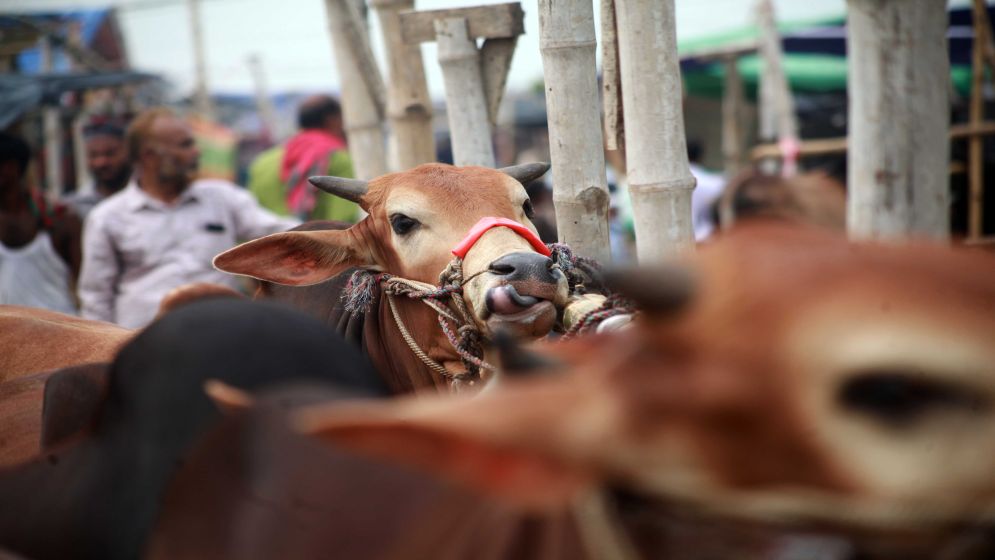Can Dhaka's Qurbani waste management plans withstand the forecasted Eid downpour?

Celebrating Eid-ul-Adha, the second most important Islamic festival, during late summer presents unique challenges.
Unlike Eid-ul-Fitr, where rainy days can be enjoyed indoors with festive food and warm drinks, Eid-ul-Adha involves outdoor activities like animal sacrifice and meat distribution, making it difficult to celebrate amidst wet weather.
The process of sacrificing cattle, dealing with the aftermath, waiting for elevators with heavy buckets of meat, and navigating through crowds seeking sacrificial meat becomes even more cumbersome and unpleasant in the rain.
The wet and slippery ground, combined with the prolonged foul odor amplified by humidity, creates an atmosphere far from celebratory.
Weather forecasts across the board, even from the surprisingly accurate government meteorological department, are predicting heavy rainfall and thunderstorms from June 17-19.
Considering the city's recent struggles with waterlogging during the recent heavy rain, it's highly likely that roads and streets will once again be submerged under water due to the continuous downpour.
And with blood and waste from qurbani cattle, there is every chance that the city might witness a bizarre river of blood during the Eid day.
Why does the rain create problems?
The capital's sewerage system remains in a dire state, with no improvements from last year.
Data from the Dhaka Water Supply and Sewerage Authority (Wasa) indicates that the city relies on a 370-km storm sewerage network and 2,840 km of surface drains to channel rainwater into 22 canals.
Additionally, Dhaka North and South City corporations jointly manage over 2,000km of feeder drains to carry rainwater and household waste into canals and larger storm sewers.
These figures have remained unchanged since last year, despite a BUET study highlighting an annual influx of five lakh new residents into the capital.
This population increase suggests that the sewage disposal system has likely worsened due to the added strain on its already limited capacity.
However, to address the challenge of sacrificial animal waste during this year's potential rainy Eid-ul-Azha, the Dhaka South City Corporation (DSCC) and Dhaka North City Corporation (DNCC) have unveiled comprehensive plans to ensure its swift and efficient removal.
A combined workforce of over 18,000 sanitation workers will be deployed throughout the city, with both corporations pledging to clear the waste within 24 hours.
What strategies are taken?
DNCC and DSCC have each developed individual strategies for waste collection this year.
DSCC has mobilized nearly 9,500 employees for the cleanup effort and will utilize 360 of its vehicles, in addition to its regular garbage trucks, for waste transportation.
The civic body at the southern part of the capital is also aiding residents by distributing 140,000 eco-friendly biodegradable bags, along with bleaching powder and disinfectants.
Additionally, a specialized water vehicle will be deployed to clean areas after waste collection.
DSCC spokesperson Abu Nasher said, "We are committed to ensuring proper waste disposal during Eid and we encourage residents to cooperate with us for a smoother process."
Meanwhile, DNCC will be deploying 9,337 employees to manage the waste management task.
DNCC will utilize 480 vehicles on the first day of Eid and distribute 100,000 eco-friendly biodegradable bags along with bleaching powder and disinfectants.
Additionally, dedicated water vehicles will be deployed to clean areas after waste collection.
DNCC spokesperson Mokbul Hossain assured residents, stating, "We are fully prepared to provide a clean city after Eid. This year, we have incorporated 48 garbage trucks and 32 dump trucks for waste management."
DSCC Mayor Sheikh Fazle Noor Taposh had previously pledged to clear all waste generated from sacrificial animals within 24 hours on the first day of Eid-ul-Azha.
Meanwhile, DNCC Mayor Atiqul Islam announced an even more ambitious goal of disposing of sacrificial animal waste within six hours on Eid Day.

